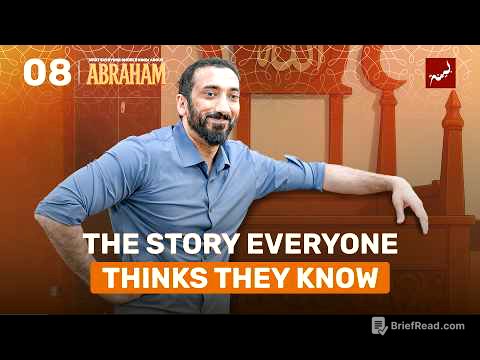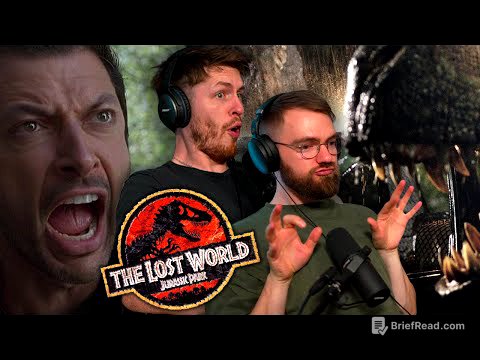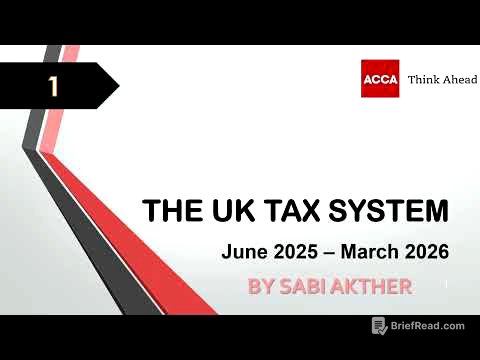TLDR;
This video explores the theological, philosophical, and scientific perspectives on whether Allah continuously creates the universe or created it and then ceased. It addresses the deist belief that God created the universe, set laws, and then left it to function on its own, arguing against this notion by using the analogy of a genius programmer who creates a robot and abandons it. The discussion covers the inseparability of time and space, the concept of spacetime, and how God creates not only space but also time. It also touches on the nature of time, the attributes of Allah, and the concept of eternal life in heaven and hell, proposing a circular or spiral flow of time in the afterlife.
- God is constantly creating, not just having created and left the universe.
- Time and space are inseparable, and God created both simultaneously.
- The concept of "now" is not universal; time varies in different parts of the universe.
- The attributes of Allah, such as being without beginning or end, should be understood beyond the concept of infinite time.
- The nature of time in the afterlife may be circular or spiral, allowing for the encompassing of eternity within God's knowledge and power.
Theological, Philosophical, and Scientific Perspectives on Creation [0:09]
The question of whether Allah continuously creates the universe or created it and then stopped is a significant theological issue that also requires philosophical and scientific consideration, particularly from the perspective of physics. The deist belief suggests that God created the universe, established its laws, and then left it to operate independently. This view is challenged by arguing that it is illogical for a creator to abandon their creation after endowing it with intelligence and purpose, using the analogy of a programmer abandoning a sophisticated robot in Antarctica.
The Continuous Creation of Time and Space [2:31]
God Almighty is constantly creating, not just having created and left the universe to its own devices. This continuous creation extends to both space and time. From a scientific viewpoint, time and space are inseparable, forming what is known as spacetime. According to Big Bang models, the universe was created together with time, refuting the misconception of an explosion within an infinite space. The Big Bang occurred at a point in time (t=0), marking the simultaneous creation of time and space by God.
Understanding Time from a Human and Divine Perspective [4:26]
The concept of continuous creation is understood differently from a human perspective, which is bound by time, compared to God's perspective, which transcends time. The notions of past, present, and future are human constructs, and there is no universal "now" in the universe. Time varies across different galaxy clusters. God creates every moment and time, but from God's perspective, all times exist simultaneously.
Minkowski's Onion Model and the Nature of Time [6:32]
Hermann Minkowski compares the universe to an onion, with the Big Bang at its center and expanding spacetime slices forming the onion's layers. This model suggests that past spacetime zones still exist and can be observed through telescopes. While humans are confined to their current spacetime period, God Almighty perceives all times—past, present, and future—simultaneously. Concepts like the apocalypse, heaven, and hell are present for God.
Attributes of Allah and the Concept of Eternity [8:37]
The attributes of Allah, such as being without beginning (seniority) and endless (permanence), are not merely about an infinite timeline but about transcending time itself. God created time and is not bound by it. Different regions in the universe experience different time flows. The question of eternal life in heaven and hell raises the issue of how infinite time can be encompassed. It is proposed that time in the afterlife may flow in a circular or spiral manner, allowing God's power and knowledge to encompass all within a limited scope, even if it is infinite.
Philosophical and Theological Views on Time's Flow [10:21]
Time, from a scientific perspective, flows unidirectionally like a river, preventing travel to the past due to paradoxes like the grandfather paradox. While theoretically, one can travel to the future by speeding up, God Almighty exists beyond these constraints, with the past, present, and future available simultaneously. The concept of eternal life in heaven and hell is explored, suggesting that time may not flow linearly but circularly or spirally in the afterlife, allowing it to be encompassed within God's knowledge and power.
Conclusion: Understanding Allah Beyond Similes [14:04]
It is crucial to understand the attributes and names of God Almighty to avoid misconceptions. Those who create similes about Allah are essentially believing in a God of their own imagination. A deeper understanding of these concepts, combined with insights from physics regarding time and space, is essential for comprehending the nature of creation and the divine.









